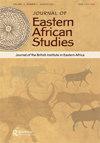国家主导的埃塞俄比亚制糖业现代化:低地转型中的权力和代理问题
IF 0.6
3区 社会学
Q2 AREA STUDIES
引用次数: 0
摘要
摘要本文批判性地分析了埃塞俄比亚糖业的历史,重点是旨在改造低地的驱动因素、决策以及整合和排斥过程。我们认为,政府利用国家主导的糖业现代化和扩张来巩固中央政府的权力。通过创建以糖为基础的农业综合企业,不断变化的政权试图扩大对自然资源的控制,增加劳动力流动,刺激经济增长。这导致了国家结构的深化和权力关系的重大转变,导致受影响社区的边缘化。在埃塞俄比亚2018年后的政治和经济转型中,这一现代主义和扩张主义计划陷入了一系列深刻的经济和金融危机,导致政府采取措施将糖业私有化。作为对私有化倡议的回应,地方精英阐明并质疑边缘化的历史进程,并竞争要求纠正社区的不利融合。他们这样做是为了扩大社区的代理空间,并通过收购策略来强化他们从私有化过程中获得利益,或许还能主导私有化过程。过去造成边缘化的现代主义发展方法可能会影响低地转型的新阶段。本文章由计算机程序翻译,如有差异,请以英文原文为准。
State-led modernization of the Ethiopian sugar industry: questions of power and agency in lowland transformation
ABSTRACT This article critically analyses the history of the Ethiopian sugar industry, with emphasis on drivers, decision-making and processes of incorporation and exclusion aiming to transform lowlands. We argue that the government has used a state-led modernization and expansion of the sugar industry to consolidate the power of central governments. Through the creation of sugar-based agribusinesses, the changing regimes have sought to extend their control over natural resources, increase the movement of labour, and stimulate economic growth. This has led to deepened state structures and considerable transformation of power relations, causing marginalization of the affected communities. In Ethiopia’s post-2018 political and economic transition, this modernist and expansionist programme found itself in a set of deep economic and financial crises, leading to government initiatives to privatize the sugar industry. In response to the privatization initiatives, local elites articulate and contest the historical process of marginalization and compete in demanding redress for the adverse incorporation of the communities. They do so to expand the community space for agency and enforce their interests in gaining from, and perhaps dominating a privatization process through takeover strategies. The past modernist development approach that caused marginalization is likely to affect a new stage of lowland transformation.
求助全文
通过发布文献求助,成功后即可免费获取论文全文。
去求助
来源期刊

Journal of Eastern African Studies
AREA STUDIES-
CiteScore
3.30
自引率
7.10%
发文量
12
期刊介绍:
Journal of Eastern African Studies is an international publication of the British Institute in Eastern Africa, published four times each year. It aims to promote fresh scholarly enquiry on the region from within the humanities and the social sciences, and to encourage work that communicates across disciplinary boundaries. It seeks to foster inter-disciplinary analysis, strong comparative perspectives, and research employing the most significant theoretical or methodological approaches for the region.
 求助内容:
求助内容: 应助结果提醒方式:
应助结果提醒方式:


